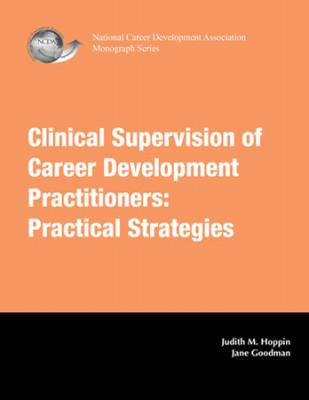 The monograph Clinical Supervision of Career Development Practitioners provides a helpful synopsis of supervision theories and strategies to use when working with career counseling practitioners. Authors Judith M. Hoppin and Jane Goodman outline the importance of supervision with career practitioners, the credentials needed to become a supervisor and useful guidelines for supervision practice.
The monograph Clinical Supervision of Career Development Practitioners provides a helpful synopsis of supervision theories and strategies to use when working with career counseling practitioners. Authors Judith M. Hoppin and Jane Goodman outline the importance of supervision with career practitioners, the credentials needed to become a supervisor and useful guidelines for supervision practice.
The monograph begins by discussing the value of supervision in career counseling practice and the credentials associated with career practitioners and supervisors. After overviewing credentials, Hoppin and Goodman address supervision theories and strategies broadly before presenting techniques specific to working with career practitioners. The authors discuss the skills that promote successful supervisor–practitioner relationships and the role of supervisors throughout the supervision process. The book then details alternative methods for providing supervision, including group, peer and distance supervision, in addition to or instead of traditional one-on-one supervision. The authors conclude by presenting information about legal and ethical issues and suggestions for giving and receiving evaluative feedback.
The brevity of the book makes it a convenient resource for novice supervisors who wish to review their understanding of basic supervisory principles. Prospective supervisors taking coursework to pursue supervisory licensure, especially those who wish to work with career practitioners, could benefit from using the monograph as a supplement to other class materials. Additionally, students and less experienced career practitioners and licensed professional counselors may all see value in reading the text to understand the purpose and process of supervision.
Hoppin and Goodman succeed at presenting a concise overview of career counseling and supervisory credentials, supervision strategies, and ethical and legal issues. They detail credentials for career practitioners, career coaches and supervisors in an easy-to-follow format. The authors also outline strategies and resources to use in supervision with career counseling practitioners. Activities such as the “Take Action” diagram and the “Role Boundary Analysis Chart” are valuable for work with career practitioners who must understand and balance their focus between clients’ career and personal concerns. Inclusion of templates for disclosure statements, informed consent agreements, supervisor notes and evaluations serve as practical resources for novice supervisors. In addition, the monograph delivers a helpful overview of the ethical and legal issues that career practitioners and supervisors may encounter and the National Career Development Association’s ethical guidelines for handling such situations. The examples of hypothetical scenarios can help career counseling supervisors and practitioners understand the complexity of legal and ethical obligations in everyday practice. By providing a brief overview of supervisory credentials, strategies and ethical guidelines, the book serves as a convenient and useful text for neophyte supervisors and practitioners.
Although the text offers a succinct and readable summation of supervision generally and some examples of particular strategies for work with career practitioners, limitations exist. The book mainly addresses supervision theories, strategies, types and evaluative processes that align broadly with supervision of any counseling practitioner rather than specifically with career counseling practitioners. Presenting additional strategies and theories specific to working with career practitioners would be important to include in future publications. Additionally, the text seems to target novice supervisors who are working with students or less experienced practitioners. Adding strategies for more experienced supervisors as well as for supervisors who work with experienced career practitioners should be future considerations.
Clinical Supervision of Career Development Practitioners is a practical and recommended resource for neophyte supervisors who wish to gain a broad overview of supervision theory, techniques and strategies.
Reviewed by: Elizabeth Walker, NCC, High Point University, High Point, NC.
Hoppin, J. M., & Goodman, J. (2014). Clinical supervision of career development practitioners: Practical strategies. Broken Arrow, OK: National Career Development Association.
The Professional Counselor
